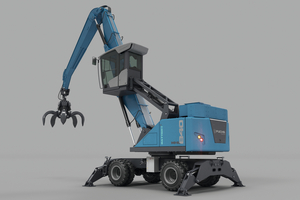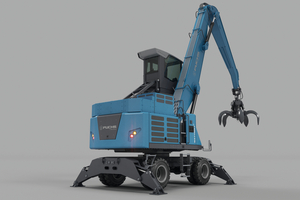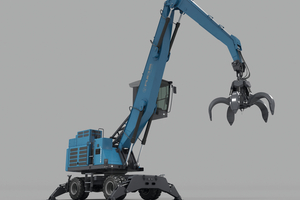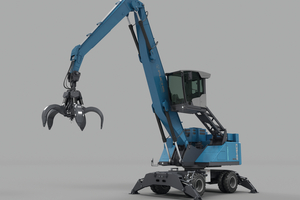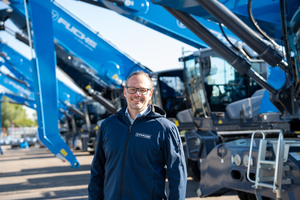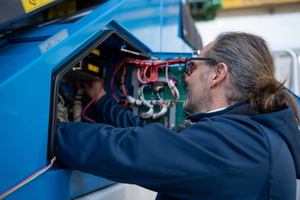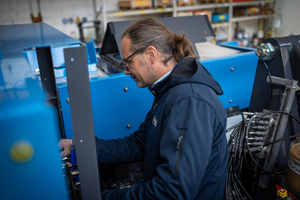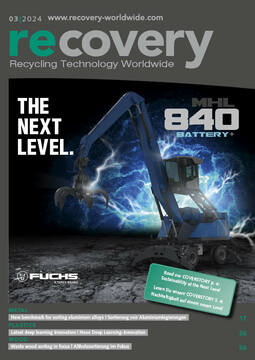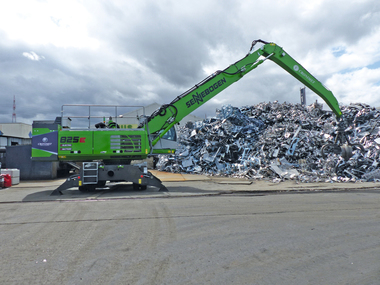FUCHS A Terex Brand Unveils the MHL840 BATTERY+ at IFAT
Sustainability has always been integral to FUCHS. Since the delivery of the first electrically powered material handler in the 1980s, FUCHS has continually expanded its portfolio of electric machines, with all models (except for timber handlers) now available as electric variants. With the introduction of the “Powerpack“, a diesel/hydraulic add-on module, FUCHS reached another milestone, enhancing the flexibility of cable-connected electric machines.
Now, FUCHS is pushing the boundaries of electric mobility with the MHL840 BATTERY+. Designed with sustainability and practicality in mind, the MHL840 BATTERY+ offers maximum flexibility for customers. Its modular battery system allows for incremental expansion, ensuring that customers pay only for the battery capacity they need. Even in its basic configuration, the installed lithium-ion batteries provide enough power for up to three hours of autonomous operation without any loss in performance.
Charging the machine is a breeze, akin to charging a laptop. Once connected to the local power supply, the batteries automatically charge as needed, eliminating the need for a separate charger, and ensuring years of reliable operation.
The MHL840 BATTERY+ also features optional automatic load peak shaving, combined with a standard soft starter, reducing strain on the local power grid, and lowering operational costs. It‘s the ideal choice for those seeking environmentally and economically friendly solutions. Additionally, its compatibility with less powerful mains connection points offers added flexibility.
Whether dealing with household waste, construction waste recycling, biomass, or mixed scrap, the MHL840 BATTERY+ is the optimal machine for your needs. With finely tuned 2-circuit hydraulics, it ensures fast and precise work cycles with maximum useful performance.
Under the BLUE Evolution strategy, FUCHS remains committed to expanding its portfolio of emission-free handling machines. Stay tuned for more innovations, exemplified by the groundbreaking MHL840 BATTERY+.
Modularity is a decisive factor
On the occasion of the launch of the MHL840 BATTERY+ with modular battery system, we were able to talk to Christian Oppermann, Principal Design Engineer at Fuchs, about the development of the new material handler.
recovery: Could you please introduce yourself as well as your career path and responsibilities at FUCHS?
Christian Oppermann: I started as a software developer at FUCHS 7 years ago. For the past 5 years, I‘ve been responsible for the electric machine infrastructure and software development. Prior to that, I worked in the wind energy sector for about 9 years, first as a technical product manager for electrical systems and software integration, then for 6 years as Head of Electrical Engineering & Head of Application Engineering.
During this time, I focused on electrical infrastructure, operating large-scale wind turbines, and regulating renewable energy on distribution grids. I also managed the certification of generation units and power plants, overseeing the certification process from wind park construction to grid connection in Europe.
recovery: What were the most exciting challenges in developing the MHL840 BATTERY+ material handler? What was your role in this project?
Christian Oppermann: Embarking on such a project involves numerous exciting interdisciplinary challenges, from mechanical and electrical integration to cooling, climate control, and later operational safety concepts.
I believe anyone who enjoys technology will find an exciting task in such a machine!
My team and I focused on the electrical infrastructure and operational software. Our main tasks included integrating high-voltage electrical components, connecting them to the machine infrastructure, and integrating the software for operating modes such as grid operation and battery operation. Ensuring the machine‘s battery capacity and network connection could be tailored to customer needs in the future was a crucial factor. From these parameters, we developed a concept that can be adapted to almost any Fuchs electric machine in the future.
recovery: What new features does the machine bring to the market?
Christian Oppermann: The machine operates without additional charging infrastructure. A standard 400V three-phase power connection with adequate power supply is sufficient for operation. By plugging or unplugging the power plug, the machine automatically recognizes the operating mode and switches it when all conditions are met.
In grid operation with the power plug connected, the machine regulates the energy balance through our operational software depending on the available energy source. Both machine output power and battery charging power can be influenced. In the standard configuration, the machine‘s output power takes precedence over battery charging power, allowing full machine performance to be achieved. Battery charging power can vary depending on operating conditions and workload. Under optimal conditions, it is possible to work with full performance and charge the batteries in parallel within an hour.
Battery operation provides the user with the necessary mobility. Here, too, the MHL840 BATTERY+ can be operated with full performance without restrictions. The runtime varies depending on the desired battery capacity and application.
Reducing machine output power during battery operation is also possible. Especially when the mobile task at hand does not require the full machine performance, operators have the opportunity to influence their battery runtime.
Additionally, the concept offers other innovative, future-proof features that set it apart in the market.
All these features are important building blocks, in our view, to support our customers sustainably in their transition to electric systems and to provide future-proof opportunities for targeted use of available electrical energy.
recovery: For what applications was the MHL840 BATTERY+ developed, and where do you see the primary areas of use? Are there any reference projects?
Christian Oppermann: The goal is to design industrial processes so that a large portion of the work can be done without energy storage. The application is therefore aimed at operators in industrial environments, such as scrap yards and recycling centers, who do not focus on 8-hour battery operation but want to make their operational infrastructure more sustainable. For this purpose, and to better understand their needs, challenges, and processes, we must and want to engage in dialogue with operators and jointly develop the most sensible, holistic electrification concept. I am convinced that with our technology, we offer a suitable solution for most customers in material handling.
A similar concept was introduced at the last bauma with the MHL820 BATTERY+. However, with the MHL840 BATTERY+, we are not only introducing another machine type with a battery but also further developing the electric powertrain and operational management.
recovery: Are there different versions adapted to the application area?
Christian Oppermann: The MHL840 BATTERY+ can be optimally adapted to the various operating conditions at our customers. Due to its modular design and extensive parameter setup, there are many customization options available to meet customer needs. Additionally, the battery capacity can be scaled according to the application, ensuring the most efficient and cost-optimized electric material handler. The required power supply can also be varied to optimize it for the customer‘s specific conditions. As a result, the machine can be adapted to changing connection and operating conditions at the customer‘s site in the future.

